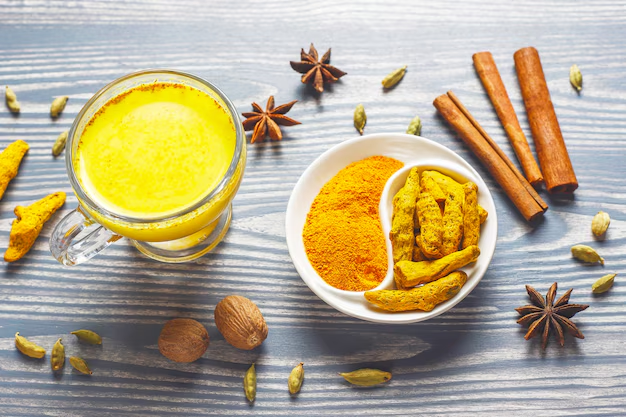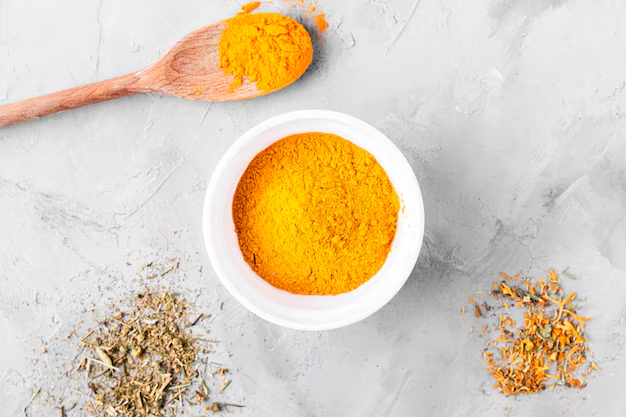Inflammation is the body’s natural response to injury or infection. While it helps in healing, chronic inflammation can lead to serious health problems, including arthritis, heart disease, and even diabetes. Managing inflammation is essential to maintaining good health.
Turmeric, a bright yellow spice, is a popular natural remedy for inflammation. Its active compound, curcumin, has powerful anti-inflammatory properties. But is turmeric good for inflammation? Let’s explore why this golden spice has earned its place as a health booster.
What Makes Turmeric Good for Inflammation?
Curcumin, turmeric’s main active ingredient, gives it its powerful effects. It works by interacting with the body’s inflammation pathways. Specifically, curcumin blocks molecules like NF-kB, which trigger inflammation. This helps reduce swelling, redness, and pain.
Scientific studies strongly back turmeric’s benefits. Research shows that curcumin reduces inflammation in the body. For example, a study published in BioFactors found that curcumin significantly decreases levels of CRP, an indicator of inflammation. Its antioxidant properties further enhance its ability to fight oxidative stress.
Unlike many over-the-counter medications, turmeric provides these benefits naturally, with minimal side effects. This makes it a safe option for people seeking long-term inflammation relief.
Benefits of Turmeric for Inflammation
All of the turmeric benefits are explained below.
1. Pain Relief
Turmeric is widely praised for reducing pain caused by inflammation. People with arthritis often find relief by incorporating turmeric into their diets. Studies show it can reduce joint swelling and stiffness, especially in rheumatoid arthritis and osteoarthritis. Its anti-inflammatory effects also make it useful for muscle soreness and sports injuries.
2. Turmeric for Your Stomach
Inflammation in the stomach can lead to issues like bloating, gastritis, and irritable bowel syndrome (IBS). Turmeric helps calm the stomach lining by reducing inflammation and promoting healthy digestion. Its natural antibacterial properties also help fight infections that might aggravate stomach issues.
3. Turmeric for Lung Health
Chronic inflammation in the lungs is a common problem for people with asthma or chronic obstructive pulmonary disease (COPD). Turmeric can ease airway inflammation, making breathing easier. Studies suggest it may also help reduce oxidative damage caused by pollution and smoking.
4. Joint Pain and Arthritis Relief
Joint pain, whether due to arthritis or overuse, can severely affect mobility. Turmeric works wonders for inflamed joints by reducing swelling and improving flexibility. Many people report reduced pain when using turmeric supplements regularly. Combining turmeric with ginger can amplify its effects. Ginger is another natural anti-inflammatory powerhouse, and together, they provide even greater relief.
5. Overall Body Inflammation
Inflammation is not just limited to specific organs. Chronic inflammation can affect the whole body, leading to fatigue and weakness. By lowering systemic inflammation, turmeric helps you feel more energized and less achy.
Turmeric often works better when paired with other natural ingredients. For example, ginger and turmeric together provide enhanced relief from pain and swelling. Black pepper is another great addition. It contains piperine, which boosts the absorption of curcumin by up to 2,000%. This combination ensures you get the most out of turmeric’s healing properties.
Turmeric Benefits for Women
It offers specific benefits tailored to women’s health needs.
Hormonal Balance
Turmeric supports hormonal balance by reducing inflammation in the endocrine system. This can help manage symptoms of polycystic ovary syndrome (PCOS) and other hormonal disorders.
Menstrual Relief
For menstrual pain, turmeric acts as a natural anti-inflammatory. It helps ease cramps, reduce bloating, and stabilize mood swings during the menstrual cycle.
Anti-Aging Properties
Its antioxidant properties protect the skin from oxidative stress, preventing wrinkles and maintaining a youthful glow. Turmeric also boosts collagen production, improving skin elasticity.
Inflammation-Related Conditions in Women
Turmeric can help manage chronic inflammation linked to endometriosis, uterine fibroids, and autoimmune diseases like lupus. By lowering inflammatory markers, it provides relief and improves quality of life.
How to Take Turmeric for Inflammation?

Turmeric comes in many forms, and each has its unique benefits. Here’s how you can incorporate it into your daily routine:
Ground Turmeric
Ground turmeric is the most versatile form. You can use it as a spice in curries, teas, or soups. But is ground turmeric good for inflammation? Absolutely! A teaspoon daily can help reduce inflammation in the body. Just remember to add a pinch of black pepper to boost its absorption.
Raw Turmeric
Raw turmeric is fresh and packed with curcumin. You can slice it, blend it into smoothies, or brew it into tea. Is raw turmeric good for inflammation? Yes, it’s one of the most potent forms, offering maximum benefits when consumed fresh.
Capsules and Supplements
Capsules are a convenient way to get a consistent dose of turmeric. They are especially useful for those who don’t enjoy the taste of turmeric. Look for supplements that include black pepper for better absorption.
Liquid Turmeric
Liquid turmeric extracts are highly concentrated and easy to take. You can mix them with water or add them to smoothies. Is liquid turmeric good for inflammation? Yes, it’s fast-absorbing and effective.
Fermented Turmeric
Fermentation enhances turmeric’s bioavailability, making it easier for your body to absorb. This form is excellent for gut health and reducing inflammation in the digestive system.
Turmeric Tea
Turmeric tea is a soothing way to reduce inflammation. Combine ground turmeric, ginger, and honey in hot water for a comforting, anti-inflammatory drink. Add a squeeze of lemon for extra flavor and vitamin C.
Dosage and Tips
- Start Small: Begin with 500-1,000 mg of turmeric or 1-2 teaspoons of the spice daily.
- Add Black Pepper: Always pair turmeric with black pepper to enhance absorption.
- Consistency is Key: Take turmeric regularly for the best results.
Turmeric is a versatile and effective remedy for inflammation. Whether you choose capsules, tea, or raw slices, this golden spice can improve your health in numerous ways.
When to Take Turmeric for Inflammation?
The timing of turmeric intake can enhance its effectiveness. Morning is ideal for people looking to reduce inflammation and improve digestion. A dose with breakfast can boost metabolism and help start the day on a positive note. For those with joint pain or inflammation that worsens at night, taking turmeric in the evening can provide relief and improve sleep quality.
Recommended Dosage for Optimal Results
The standard dosage for turmeric varies based on the form you choose. For powdered turmeric, 1-3 grams per day (roughly ½ to 1 teaspoon) is effective. If you prefer curcumin supplements, 500-1,000 mg daily is a common recommendation. Always take turmeric with black pepper or a source of fat to enhance curcumin absorption. Avoid exceeding 2,000 mg daily to minimize the risk of side effects.
Potential Risks and Side Effects

Turmeric is generally safe, but excessive use or individual sensitivities can cause side effects. Here are 10 potential risks:
- Digestive Issues: High doses can cause bloating, nausea, or diarrhea.
- Gallbladder Problems: It may worsen gallstones or bile duct obstructions.
- Blood-Thinning Effects: Turmeric can increase the risk of bleeding, especially in people on anticoagulants.
- Liver Stress: Overuse can affect liver enzymes, particularly in sensitive individuals.
- Kidney Stones: The oxalates in turmeric may contribute to kidney stone formation.
- Allergic Reactions: Some people may experience rashes or itching.
- Lower Blood Sugar: It may cause hypoglycemia in people with diabetes.
- Iron Absorption Issues: Turmeric can interfere with the body’s ability to absorb iron.
- Heartburn: High doses may irritate the stomach lining.
- Drug Interactions: Turmeric can interact with medications like blood thinners, antacids, or diabetes drugs.
Medications to Avoid with Turmeric
If you’re taking medications like aspirin, warfarin, or ibuprofen, avoid turmeric supplements. It may amplify their blood-thinning effects. Additionally, those on diabetes or blood pressure medication should consult a doctor, as turmeric may enhance the effects of these drugs.
Comparing Different Types of Turmeric Products
Choosing the right product is crucial for effectiveness. Brands like Costco turmeric are popular for their affordability and quality. Supplements from trusted companies often include black pepper for better absorption.
Fermented Turmeric vs. Regular Spice
Fermented turmeric undergoes a process that enhances its bioavailability. This means the body absorbs it more efficiently than regular spice. It’s particularly beneficial for gut health and reducing inflammation in the digestive system.
How to Use the Spice?
The powdered form of turmeric is versatile. It’s perfect for cooking, tea, and smoothies. While it may take longer to show results than supplements, it remains an affordable and natural option.
20 Benefits of Turmeric Beyond Inflammation
Turmeric’s benefits extend far beyond managing inflammation. Here are 20 broader health advantages:
- Rich in Antioxidants: Fights free radicals, reducing oxidative stress.
- Boosts Digestion: Improves gut health and reduces bloating.
- Supports Heart Health: Lowers cholesterol and improves blood vessel function.
- Enhances Brain Health: Curcumin boosts memory and may reduce the risk of Alzheimer’s.
- Eases Depression: Helps balance mood by increasing serotonin and dopamine levels.
- Improves Skin Health: Reduces acne and soothes skin irritation.
- Strengthens Immunity: Its antimicrobial properties help fight infections.
- Supports Weight Loss: Aids in metabolism and reduces fat storage.
- Reduces Allergy Symptoms: Eases sinus inflammation and nasal congestion.
- Improves Liver Function: Detoxifies and reduces liver inflammation.
- Lowers Blood Pressure: Supports healthy blood flow and vessel function.
- Regulates Blood Sugar: Helps manage diabetes by improving insulin sensitivity.
- Prevents Cancer: Curcumin may inhibit tumor growth in certain cancers.
- Relieves PMS Symptoms: Reduces cramps and hormonal fluctuations.
- Boosts Athletic Performance: Reduces muscle soreness and speeds recovery.
- Supports Eye Health: Protects against oxidative damage to eye tissues.
- Improves Sleep: Reduces stress and promotes relaxation.
- Promotes Oral Health: Fights gum disease and oral infections.
- Aids in Wound Healing: Speeds up recovery by reducing inflammation.
- Balances Gut Flora: Supports healthy gut bacteria and reduces IBS symptoms.
FAQs
1. Can turmeric be taken daily for inflammation?
Yes, turmeric can be taken daily in recommended doses. It helps manage inflammation naturally, but consult a healthcare provider to ensure it’s safe for you and avoid potential interactions or side effects.
2. Is turmeric better than over-the-counter anti-inflammatory drugs?
Turmeric is a natural option with fewer side effects for managing mild inflammation. However, it may not provide immediate relief like OTC drugs. Combining turmeric with professional advice ensures effective and safe use.
3. How long does it take for turmeric to reduce inflammation?
Depending on the severity and individual response, turmeric may take several days to weeks to reduce inflammation. Consistent use of proper absorption techniques, like combining with black pepper, improves effectiveness over time.
4. Who should avoid turmeric?
Individuals with gallbladder issues, bleeding disorders, or those on blood-thinning medications should avoid turmeric. Pregnant women, diabetics, or people with allergies should consult a doctor before incorporating turmeric into their routine.
Conclusion
Turmeric is a natural and powerful tool for managing inflammation. Its active compound, curcumin, interacts with the body’s inflammation pathways to provide relief. From joint pain to lung health, turmeric offers numerous benefits. The best part? It’s safe, affordable, and easy to use in various forms.
By incorporating turmeric into your diet or routine, you can reduce inflammation naturally. Pair it with black pepper or ginger to maximize its effects. Give it a try and experience the difference it can make in your health.

